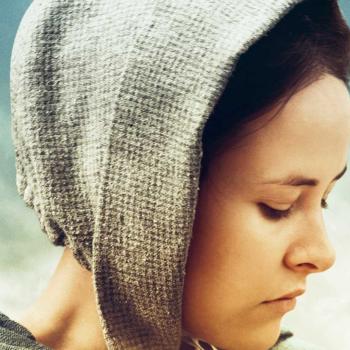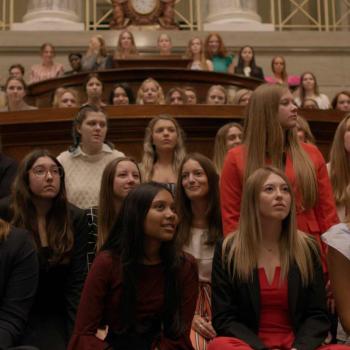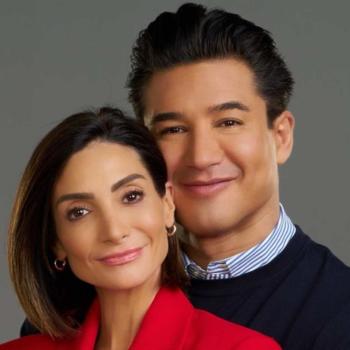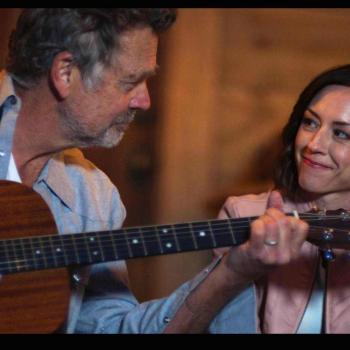The 9/11-themed Broadway musical “Come from Away” gets the high definition “Hamilton” treatment on AppleTV+, just in time for the 20th anniversary of the terrorist attacks.
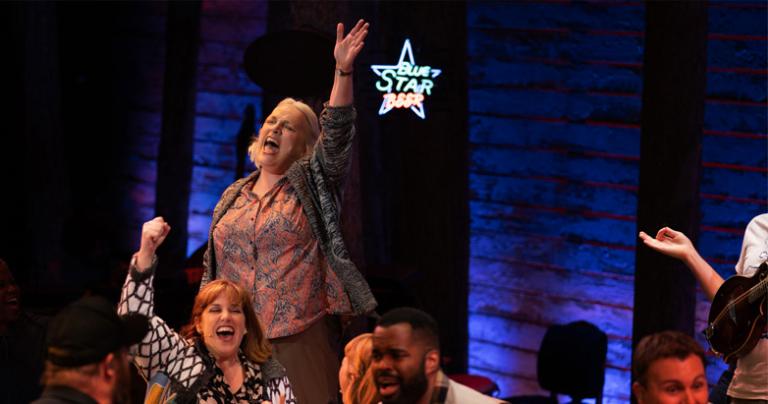
Written by Irene Sankoff and David Hein and directed by Christopher Ashley, the well-crafted and engaging musical tells the story of 7,000 passengers stranded on the small island of Newfoundland and Labrador, off the Atlantic coast of Canada, who were befriended and welcomed by a group of compassionate and mobilized locals.
The bonds the strangers and natives shared in the small town of Gander during those days, performed by an impressive cast of twelve actors, are explored in comedic and dramatic ways in the musical, filmed for broadcast during the pandemic. Some of the strangers relied on faith, others on hope, but they all shared compassion and love for each other. “Come from Away” is a stirring reminder of how tragedy can bring out the very best in people.
In a recent interview, the creators and cast discuss how the faith, compassion, love, and grace of the passengers and citizens affected the story, and the lessons audiences can take away from it.
Hannah relies on her faith a lot to get her through this very dark time. I’m wondering if you can talk about the importance of faith within this musical.
Q Smith (“Hannah” and others): In the Bible, it says “Faith is the thing that we cannot see, but the thing to hope for.” So, whether you are religious or not, I think we all have some sort of faith. We have faith that when we walk outside, we’re not going to get hit by a car. We have faith that we’re going to wake up in the morning. That’s the hope, right? I remember calling Hannah one day, and her granddaughter answered. “She’s at church praying. She’s always a church praying. I don’t know when she’s coming home.” But she is a person of faith. And I think having that Irene and David wrote that as a part of her character in the show. They did not stray far away from who she really is, a sweet little Irish woman. They wrote that into the show, and I feel like it grounds her. It gives her strength. And in real life, it gives her strength and in real life, it gives me strength too. I remember in rehearsals, learning that she is a woman of faith. I said, “Is it okay if she was across the necklace?” And they said “Yes.” So I wear it often. And I wear it in the show, and I touch it often. And it’s actually for Hannah and Her son and her family. Every time I touch it, it is for them.
Astrid Van Wieren (“Beulah” and others): People are leaning into their belief systems, particularly when everybody is together in the library, and everybody is coming to offer up prayers and hope for peace. So, you have Ali there, saying his prayers you have the rabbi. You have all these different people with different faiths together all for the same goal, which is peace, peace and love and kindness. And I think that the show speaks to it very strongly there. With Beulah and Hannah, it is definitely a place where they connect and that they pray together and that in praying together that that strengthens their friendship because they speak a similar language, even though they’re from completely different walks of life, they both understand that they both have firefighter sons. So that’s another place where they connect.
How did you deal with the emotion of (performing this story)?
Joel Hatch (Claude and others): If you asked anybody in the cast, they’d say, “Joel’s a crier.” I cry a lot. And it’s a way that I’ve found to cope. Because the people that they’re dealing with had a world of pain. And they were frightened for their loved ones. They were away from their home. They couldn’t communicate with the people in their lives because communications were different at that time. So they dealt with a lot of very frightened people. That has an impact on people. It was helpful to actually meet Claude. Before he became mayor of Gander, he was an emergency medical technician. He went out to emergencies all the time, and he helped people who are in need. So, he’s like the perfect guy to have this job at that moment. And he’s always got a joke. He’s always jovial. You always feel better after you talk to him. So that is how I focus. That’s how I have to deal. We tell jokes backstage, all the time because that helps us stay in that place that’s positive.
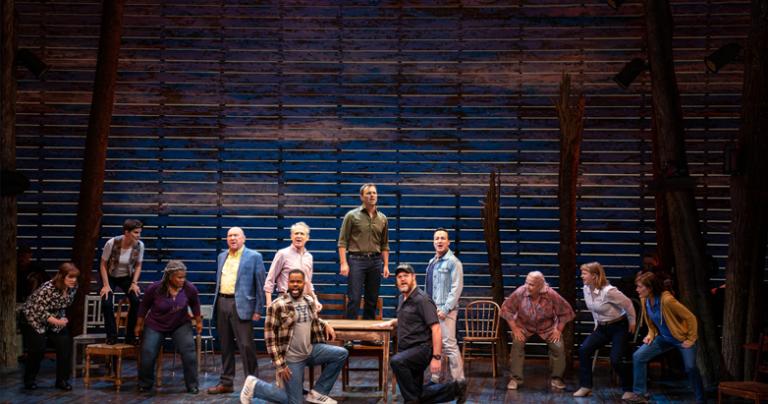
Image courtesy of Apple TV+.
This is a beautiful story that comes out of a very dark time. Do you hope that people will be changed as they see it?
Q Smith: I hope that everyone will walk away as a Newfoundlander. We were in Newfoundland before we came to New York to open the show, and seeing how they keep their doors open and unlocked and seeing how they just sort of treated us like family immediately just opened my heart wide open. And I was like, “I want to be more like that.” And I hope that the people sitting in the audience look on stage and say, “I want to I want to be like that, too. How can I be of service?” The show is full of hope and full of acceptance and full of kindness. And I just want people to leave the show with those feelings.
Paul Whitty (“Oz” and others): I think the show addresses in some ways the cynicism of people when people are helpful, the weariness of “Is this real? Is this sincere?” That’s another thing the story sort of goes “I acknowledge your discomfort and it’s okay to be uncomfortable.” Deal with the discomfort and accept the good nature that’s coming your way. Because that I think that takes the courage as well to let go of those. Those fears to let people be kind to you.
Sharon Wheatley (“Diane” and others): It’s such a good reminder to be thinking about your neighbor, and to be thinking about kindness. And I do think that there’s a difference between what happened after 9/11 and what’s happening now. I think that after 9/11, people were more united. And I am really missing that right now. There is an intense division happening. And, you know, both sides are right, and both sides are wrong. And, what’s missing is the “us.” I think that if people can watch this and remember that it’s one of the really great stories, that the theme that comes out of “Come from Away” is that they took care of everyone. It didn’t matter who it was.
Especially coming out of the pandemic, having been a part of the production for as long as you have, does it resonate with you differently now than it did when you first began? And if so, how?
Joel Hatch: Well, I would say that the way it resonates with me is there’s a little sadness that people still keep doing things to each other, that make it that people have to step in and help in the way that the people of Gander help people. It’s a little sad at first that history repeats itself over and over again, and that people will constantly try to divide and separate us from each other. But it also makes me far more committed to the story. Because I see that it’s vital to have a story of hope, and a story that’s positive, that people can see there is an alternative to what they’re experiencing. And there is an alternative that actually gives them joy, and not despair. It’s just made me far more committed to telling the story as honestly as I can.
In so much darkness, there was just a line of hope, like coming through. Hope was one of the most important parts of it. I’m wondering what you’re hoping this musical will teach its audience about hope.
Q Smith: There’s always hope. I actually texted my husband that this morning. He’s having some difficulties these days. And I texted him, “There is always hope.” And I feel like the people of Gander, as you’ll feel on the stage, instill that, in every person that they meet, no matter where you end up in life, no matter where you end up in the world. prayerfully hopefully, there’ll be a helping hand there to help you. It is just such an important message, knowing that hope is just a breath away, knowing that hope is right around the corner, you can be someone’s hope. It’s such a powerful message that I would love for the audience to take away.
Joel Hatch: Dovetailing on what Q said, the story that we tell includes a prayer of many different religions at the same time. And what they are doing at that moment is an active search for hope. And it’s like the old joke. You got to do something. God can’t do everything for you. And so that is a vital part of the story is that we all need to actively search for it. We can’t just wait for it to arrive.
I think people should be inspired to have a revolution of kindness, and, and basically seeing each other as humans and being helpful to one another.
Irene Sankoff (Co-Writer): That is exactly it. We walk the walk is as well. On September 11, it’s a day of service for our company, and our community members within “Come from Away” will be at Gander volunteering. I don’t know what the plans are for the rest of the company is. But I know we take it very seriously, not only on September 11, but in our daily lives to lead with kindness
David Hein (Co-Writer): It feels like there’s never a bad time to tell a story about people being good to one another. But right now, it feels important to remind people that it’s possible. And I think that’s what going out to Newfoundland reminded us was that you can build a community. If you have enough to eat over a hard winter, you share it with your neighbors, because the next winter you might be in their shoes. And there was a sense of collective responsibility and being good to one another that the people out there were raised on and when the world needed it, they were there for that. I think it’s important to remember that we can awaken that within us and live that as our lives responding to kind of with kindness every day.
Chris Ashley (Director): It’s interesting that in a show about taking care of each other, and collaboration and generosity, that in order to perform it, the actors really have to be very generous with each other. They set each other’s props and pass each other’s sweaters. And it’s not possible to perform the show without generosity. It’s been amazing to make a film where you can really get the camera in. And you can see those details of 12 people really working together to tell a story about the power of kindness.
“Come from Away,” directed by Christopher Ashley and written by Irene Sankoff and David Hein, is now streaming on AppleTV+ and resumes its Broadway performances on Sept. 21.
DEWAYNE HAMBY is a communications specialist and longtime journalist covering faith-based music, entertainment, books, and the retail industry. He is the author of the book “Gratitude Adjustment.” Connect with him on Facebook, Twitter, YouTube or InstaGram.







